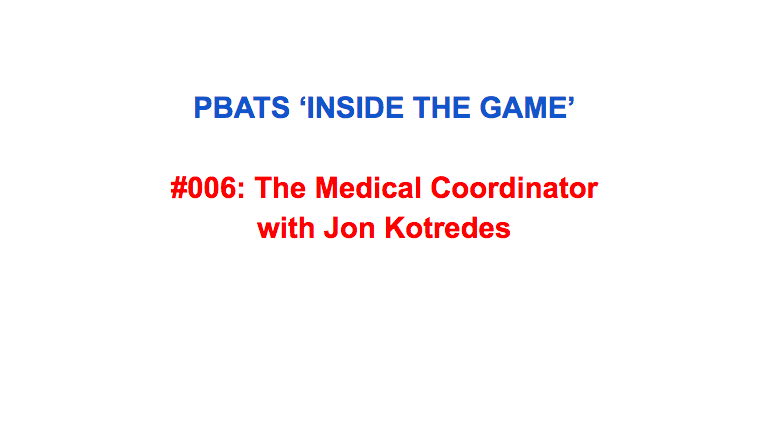Welcome back, and thanks for your interest in Inside the Game #006. Last week in the we sat down with Rob Nodine of the Seattle Mariners for #005, you can find that here. This week, we had the opportunity to speak with Jon Kotredes, of the Washington Nationals athletic training staff.
Jon currently works as the Nationals’ Medical Coordinator. Before starting his career in baseball, Jon earned his undergraduate degree from the University of Maine.
Check out the interview below and let us know what you think in the comments section.
PBATS: When did you decide that you wanted to pursue a career in athletic training?
Jon Kotredes: I had several injuries as a high school athlete and was lucky to have a wonderful ATC at the high school that I attended. As my athletic career in high school came to a close, I realized that this career would be a great way for me to stay involved with sports and help other athletes as well.
PBATS: How did you get your start in baseball?
JK: As part of our Athletic Training Education Program in college, I had the opportunity to spend 8 weeks as an intern with the Pittsburgh Pirates at their complex in Bradenton, Florida. After graduation the following December, I took an internship with the San Francisco Giants at minor league spring training and was lucky enough to be hired full time following my internship with them.
PBATS: What is your favorite part about being an athletic trainer?
JK: As an ATC I enjoy being able to help our players stay on the field and be able to compete at the highest level. It’s also very gratifying to see somebody return from a low point in his career following a surgery and be able to return to compete at the highest level.
PBATS: What is your favorite memory from working in baseball?
JK: I don’t have one specific memory that stands out, but enjoy meeting coaches and players from all walks of life.
PBATS: What are your goals for your career in athletic training?
JK: My goal is to continue to help the players that I’m working with stay as healthy as possible, so that they can follow their dream of being a Major League player.
PBATS: What are some of the most interesting parts of your job that most people might not be aware of?
JK: I think the thing that most people overlook is the mental part of the process of recovering from an injury, especially a major one. A lot of the time the players are away from their family when these injuries occur. We do more than provide medical care for these guys. You have to be part of their support system as well and help them through a very tough time mentally in their career and their life.
PBATS: What is a typical day at the park like for an athletic trainer?
JK: Typically the ATC’s are some of the first people to arrive at the stadium every day, several hours before the game begins and players and staff arrive. We get the training room all set up, so that players can begin their pre-game treatments when they arrive. Typically players will do maintenance work prior to their day beginning. Then we cover the pre-game fieldwork and the game to handle any new issues or injuries that occur during that day. Post-game treatment is a very important part of the day for us, as most guys have to be ready to play again the next day.
After the players have finished their treatments post-game, there is paperwork (a necessary evil) that must be completed every day to ensure that all players medical charts are up to date, as well as injury reports to inform others in the organization on the progress that our injured players are making towards returning to game activity.
PBATS: What are your favorite things to do in the off-season?
JK: In the off-season, I enjoy returning home to spend time with my family and friends that I have been away from for the long season. I also enjoy my time as a volunteer coach of the ice hockey team at the high school that I attended.
PBATS: What advice would you offer young people, college students or anyone looking to get their start in athletic training and the game of baseball?
JK: The best advice I could give someone looking to get involved in baseball is to spend as much time around the game as possible. I have learned so much from being around other ATC’s, coaches and players that have been a part of the game for many more years than I have. You can learn so much from these people just talking about the game with them and hearing about the experiences that they have had.
—
A huge thanks to Jon for taking some time to sit down with us for Inside the Game #006. Please let us know if you have any specific questions that you’d like to see answered throughout this series. Feel free to tweet at us at @PBATS using the hashtag #InsideTheGame. Or head on over to our Facebook page and share some ideas for future features!

